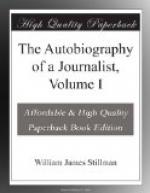I had found a tiny room in the maison meublee in the Cite d’Antin where Mrs. Coxe lived, and Mr. Coxe in returning to America had given me charge of his women folk, so that I had a social resource and a relief from tedium which gave me no expense. On Sunday the daughter came home from school, and we all went out to dine at one or another of the Palais Royal restaurants, or made, in the fine weather, an excursion into the environs. Now and then, Mrs. Coxe invited me to take them to the theatre, and thus I saw some of the famous actors, Rachel and Frederic Lemaitre being still vividly impressed on my memory. The afternoons of the week days were given to the galleries and visiting the studios of the painters whose work attracted me, and who admitted visitors. I thus made the acquaintance of Delacroix, Gerome, Theodore Rousseau, and by a chance met Delaroche and Ingres; but Delacroix most interested me, and I made an application to him to be received as a pupil, which he in a most amiable manner refused, but he seemed interested in putting me on the right way and gave me such advice as was in the range of casual conversation. I asked him what, in his mind, was the principal defect of modern art, as compared with ancient, and he replied “the execution.” He had endeavored to remedy this in his own case by extensive copying of the old masters, and he showed me many of the copies—passages of different works, apparently made with the object of catching the quality of execution.




